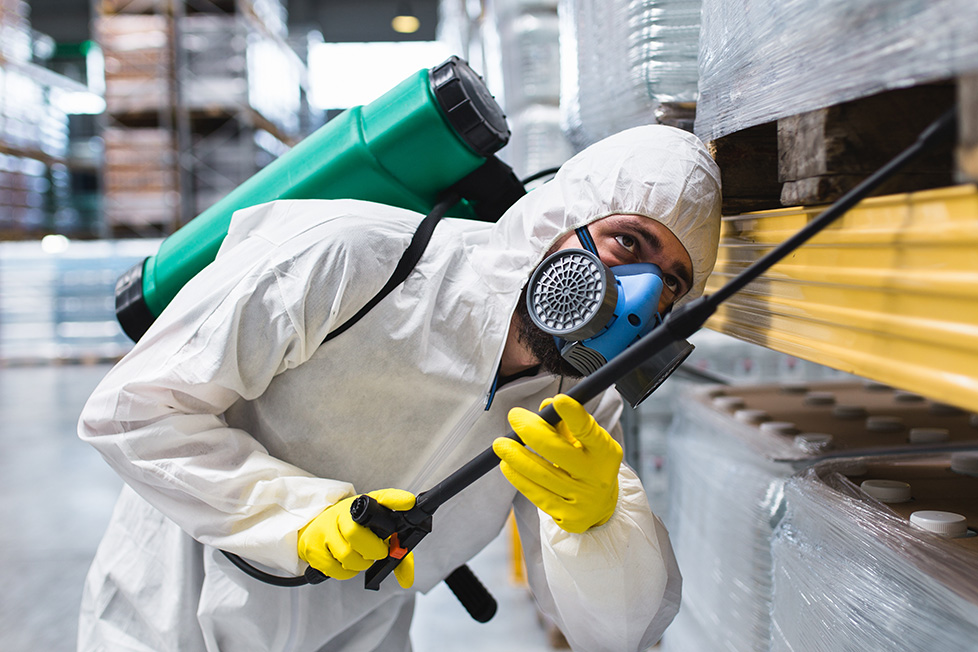Efficient Bug Control Services: An Extensive Check Out Elimination Techniques and Prevention Procedures
In the realm of parasite control services, the effective monitoring of problems calls for a careful technique that incorporates numerous techniques and procedures for both eradication and prevention. From Integrated Insect Administration (IPM) approaches that focus on sustainable options to chemical elimination strategies designed for targeted elimination, the arsenal against insects is substantial and multifaceted.

Integrated Insect Monitoring (IPM) Methods
Integrated Bug Administration (IPM) Methods include an extensive method to pest control that focuses on prevention, monitoring, and control techniques to successfully handle insect populations. By incorporating numerous methods, IPM aims to minimize the influence of insects while likewise decreasing the reliance on chemical pesticides. Avoidance lies at the core of IPM, emphasizing techniques like appropriate cleanliness, maintenance of health, and sealing access points to hinder bugs from infesting buildings.
Chemical Elimination Techniques
Chemical extermination techniques are frequently used in parasite control services to successfully get rid of pest populaces that pose a hazard to human health and wellness and residential or commercial property. These strategies involve using different chemical substances particularly developed to target and remove insects such as pests, rodents, and various other undesirable creatures. The application of chemicals, pesticides, rodenticides, and other chemical representatives is thoroughly controlled to make certain maximum performance while minimizing dangers to human beings, pets, and the environment.
Among the key benefits of chemical elimination techniques is their capability to give quick and targeted results, making them especially valuable in cases of serious problems or urgent bug control demands - a1 portland bed bug exterminator. Nevertheless, it is vital to highlight the value of appropriate handling, application, and disposal of these chemical items to prevent unintentional damage
Moreover, incorporated bug monitoring (IPM) approaches frequently combine chemical extermination techniques with other methods such as sanitation, habitat adjustment, and biological controls to create a extensive and sustainable bug control method. By integrating chemical extermination techniques judiciously within an IPM framework, insect control services can efficiently manage pest populaces while minimizing possible threats to human wellness and the atmosphere.
Biological Pest Control Techniques
Utilizing all-natural predators and parasites to manage insect populations is a sustainable method referred to as organic insect control. This method uses the all-natural devices of the ecological community to control insect populaces without relying upon artificial chemicals. One usual organic control method entails introducing all-natural opponents of the target parasite types, such as ladybugs for aphid control or nematodes for termite infestations. These all-natural killers feed on the parasites, assisting to keep their populaces in check.
Another efficient organic control technique is making use of microbial insecticides. These are naturally taking place microbes, such as infections, microorganisms, and fungis, that specifically target and infect specific bug varieties. By a pest control utilizing these microbial representatives, pest populations can be effectively decreased without creating or hurting valuable organisms damage to the setting.
Physical Parasite Prevention Actions
Executing physical parasite prevention measures entails utilizing obstacles and structural alterations to discourage pests from infesting a property or getting in. Installing door moves, displays on home windows, and sealing splits in the foundation can assist protect against insects like pests and rodents from getting access inside your home.
Another physical prevention action is the use of obstacles like fence to maintain larger parasites such as raccoons or deer far from the home. Mounting mesh or cable displays around yards can protect plants from being damaged by bugs. Correct waste management, including safeguarding wastebasket with tight-fitting covers, is important in preventing parasites like raccoons, rodents, and insects. By carrying out these physical insect avoidance actions, homeowner can considerably reduce the threat of insect invasions and the damages they can trigger.
Specialist Bug Assessment Procedures
Carrying out thorough and systematic insect examinations is a fundamental aspect of expert bug basics monitoring methods. Professional bug assessors are educated to meticulously analyze residential properties for indicators of problems, recognizing pest species, entry points, and conducive conditions.

Final Thought
To conclude, reliable pest control services utilize a selection of methods, consisting of Integrated Parasite Management techniques, chemical extermination techniques, organic controls, and physical avoidance steps. Expert parasite inspection procedures play a vital duty in recognizing and addressing pest issues in a timely way. By carrying out a combination of these methods, building proprietors can efficiently manage and prevent pest infestations.
From Integrated Insect Management (IPM) techniques that prioritize sustainable solutions to chemical elimination techniques designed for targeted removal, the collection versus bugs is diverse and large.Integrated Insect Administration (IPM) Techniques encompass a comprehensive approach to pest alpha pest control control that concentrates on control, surveillance, and avoidance approaches to effectively take care of bug populations.Chemical elimination strategies are frequently utilized in bug control solutions to properly remove pest populaces that present a threat to human wellness and building.Employing all-natural predators and parasites to manage insect populations is a sustainable technique known as biological insect control.In conclusion, effective parasite control services use a selection of techniques, including Integrated Insect Management strategies, chemical elimination approaches, biological controls, and physical prevention steps.